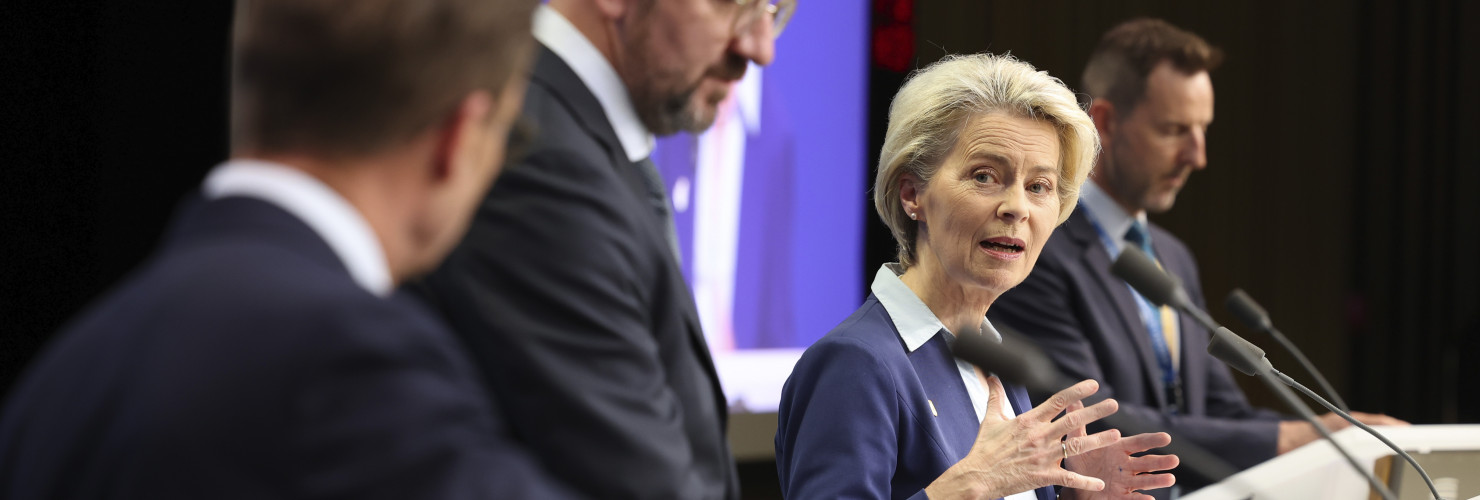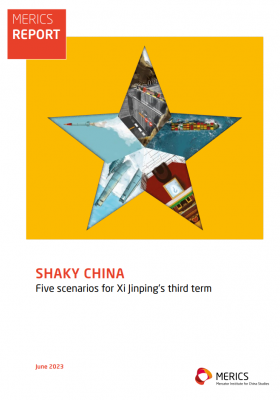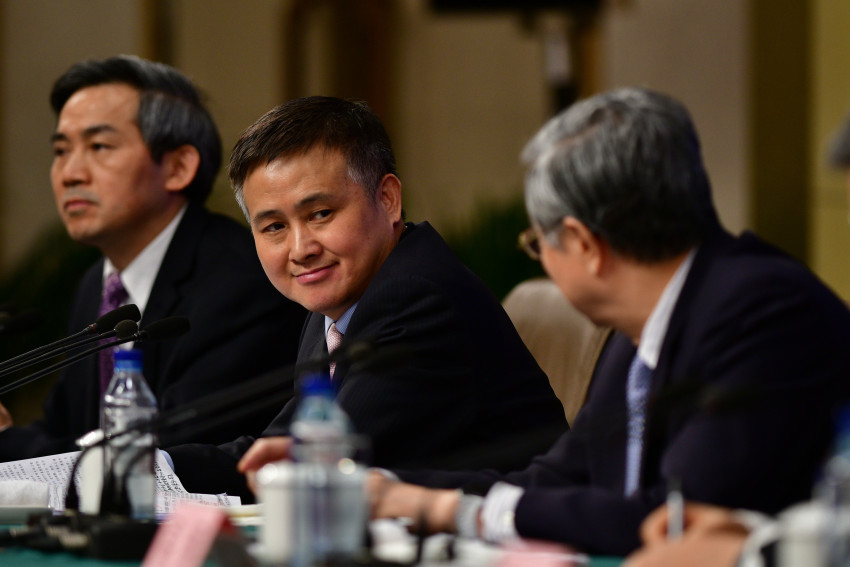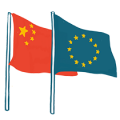
EU Council summit + Export controls + Foreign relations law
Top story
What’s next for the EU’s de-risking after the last European Council
Just as the EU has been gearing up to fortify its China policy, the European Council appeared to strike a more conciliatory tone on China at its meeting last Friday. The 27 EU leaders emphasized the need for “balanced engagement and reciprocity” in the Council’s conclusions, a stance appreciably different to that of the European Commission. Since March, the latter has pushed an assertive proposal for “de-risking” – limiting strategic dependencies, using the EU’s economic defenses more effectively, engaging in assertive dialogue – while remaining open to targeted cooperation with China.
In a nod to the Commission, the Council delivered the measured endorsement that the need to “de-risk and diversify where necessary and appropriate.” The Commission has framed de-risking as a response to Beijing “becoming more repressive at home and more assertive abroad” and the centerpiece of its proposed China policy. But the member states last Friday steered away from explicitly acknowledging just such a shift.
This shows the Commission still has its work cut out to secure the backing of European capitals and build a common front with consistent messaging towards China. EU High Representative Joseph Borrell has signaled updating the bloc’s China policy will be on the agenda of the July meeting of EU foreign ministers in the Foreign Affairs Council.
EU leaders at Friday’s meeting did show some appetite for an assertive approach to China. They called on Beijing to press Moscow to withdraw its troops from Ukraine “immediately, completely and unconditionally,” in the process pushing back on Beijing’s proposal for a “political settlement.” The Council also voiced the EU’s opposition to any unilateral change of the status quo on Taiwan, not only by force but also via coercion. This opens the possibility to call out Beijing on any interference towards Taipei.
MERICS analysis: “Given China’s intensified diplomatic outreach and hopes that Beijing’s desire for economic stability at home will make it more conciliatory, the Council may be trying to ease up on the rhetorical pressure. But for any new China policy to be credible, the EU will have to be assertive with China in the long run,” said Grzegorz Stec, MERICS Analyst. “The Commission is expected to conduct a risk assessment this fall that would be a litmus test and set the agenda of de-risking policy going forward. In the meantime, the EU should update its ten action points from its 2019 Strategic Outlook.”
More on the topic:
- Updating the EU action plan on China: De-risk, engage, coordinate. MERICS Report by Francois Chimits, Francesca Ghiretti and Grzegorz Stec
- MERICS China Opinion Pool: Recalibrating EU’s China policy
Media coverage and sources:
- European Council: Conclusions on China, June 2023
- European Commission: Speech by the President on EU-China relations
- Politico: Don’t piss off China! EU prepares to tone down its battle with Beijing
- Reuters: China cancels planned trip by Europe's top diplomat Borrell
METRIX
1,000,000
This is the bounty – in local dollars – the Hong Kong police recently put on each of eight pro-democracy activists now based overseas. The arrest warrants were issued just days after the third anniversary of Beijing’s introduction of the draconian Hong Kong National Security Law. They target former residents now living in the UK, US, Australia and elsewhere for political dissent and pro-democracy advocacy – actions that were either retroactively criminalized or took place after emigration. (Sources: Reuters, Al Jazeera)
More on the topic: Three years of National Security Law in Hong Kong: Farewell “special status”? MERICS Comment by Sophie Reiss.
Topics
Netherlands will control exports of chip-making equipment to China
The facts: The Dutch government on 30 June published its much-anticipated export controls on semiconductor manufacturing equipment. The move followed an agreement with Washington and Tokyo earlier this year to restrict the sale of certain chip-making machines to China on national security grounds. Dutch industry leader ASML will now have to ask the Hague for permission to export newer versions of its advanced immersive deep ultraviolet lithography systems (DUV) to China, as will Netherlands-based ASM International for deals involving its so-called deposition tools. The Dutch government expects to receive 20-25 license applications a year. Meanwhile, Beijing accused Washington of coercing allies to contain and decouple from China.
What to watch: Although China was not explicitly mentioned, the export curbs are widely seen to be aimed against Chinese manufacturers of advanced chips. Less clear is how far the US government might go to force other countries to adopt even tighter restrictions through national legislation designed to affect entities in other jurisdictions. According to media reports, Washington is mulling barring six Chinese chip factories from obtaining foreign equipment with even a small share of US technology, which could hamper exports of ASML’s older DUV models. The week before the Dutch government’s announcement, the European Commission published an economic security strategy, one of whose aims is to stop individual member states being coerced by larger countries.
MERICS analysis: “Any further unilateral move by the US to apply extraterritorial instruments would not go down well in Europe after months of difficult negotiations with Washington,” said Rebecca Arcesati, Lead Analyst at MERICS. “That could make it even harder for the European Commission to persuade reluctant capitals like Berlin of the need for better EU-wide coordination of export controls for critical technologies.”
Media coverage and sources:
- Dutch Ministry of Foreign Affairs (Dutch): Official announcement introducing the new licensing requirements
- Reuters (EN): Exclusive: US, Dutch set to hit China's chipmakers with one-two punch
- Chinese Ministry of Commerce (CN): Statement criticizing Dutch decision
Beijing to control gallium and germanium exports, weak spots for the US and friends
The facts: China’s Ministry of Commerce has published new export controls requiring licenses for gallium and germanium as of August 1, which could pose supply chain risks. The minerals are used in semiconductors and chips, electronics and solar products, and various optics, among others. Exporters will need to obtain licenses to sell to any given customer and they will be granted based on end use/end user metrics. Language in the measures implies that the materials are dual use (have both military and civilian applications). In terms of primary production and recycling, China produces about two-thirds of the world’s germanium and 86% of all gallium.
What to watch: The measures are clearly a shot across the bow at the US and its partners like the Netherlands, which plans to restrict China’s access to certain semiconductor manufacturing equipment. Gallium is critical for advanced semiconductor wafers, some of which are made by Japan and used by Korean and Taiwanese chipmakers. This means significant supply disruption risks – enough, Beijing hopes, to deter them from joining US restrictions on China. The measures show an increasingly mature and complex geo-economic toolkit. Beijing could simply have done what it once did to Japan when it unofficially blocked exports of rare earth minerals to Japanese customers. But the new, formal mechanisms mean China can now deter potential troublemakers while also legitimizing its export control regime.
MERICS analysis: “If they want to, the US and friends have the technology to replace these China-made minerals, but it will take some time and a lot of support to do so,” said Jacob Gunter, Senior Analyst at MERICS. “Other than through limited recycling, gallium is basically sourced by refining a by-product of aluminum production and germanium is the same but from zinc refining. China makes over half the world’s aluminum and a third of its zinc. To boost gallium and germanium production would require vast increases in aluminum and zinc, creating a whole range of related market overcapacity and ecological problems.”
Media coverage and sources:
New Foreign Relations Law expands legal foundations of Beijing’s coercive tools
The facts: A new Foreign Relations Law that took effect on July 1 formalizes Chinese Communist Party (CCP) leadership in all foreign policy matters – and reads more like a policy paper than a legal statute. It puts China’s security and development interests and global rise at the center of its engagement with the world and emphasizes its sanctioning powers. The law acknowledges the UN system and human rights but also sets China’s own – and often conflicting – norms and visions for the international order as the overriding standard. This includes China’s Global Development Initiative, Global Security Initiative and Global Civilization Initiative, key foreign policy pillars bound to appear across public and private sector dealings and agreements with foreign counterparts.
What to watch: The new law is one of many recently enacted ones with extraterritorial effects. It reflects Beijing’s resolve to take a tougher line in defending China’s interests, while adding a sheen of legality to its actions. But it is not a fundamental change in approach. China has in recent year passed laws codifying its ability to impose countermeasures and sanctions if foreign actors are seen to discriminate or restrict China. China’s leadership has already used various tools to punish unwanted behavior – economic coercion of other countries, political pressure, sanctions and boycotts targeting states, companies and other actors deemed to have violated red lines.
MERICS analysis: “While the new law strengthens Beijing’s coercive powers, it does little to ease international concerns about sudden retaliations if foreign states or companies act contrary to Beijing’s interests. In that sense, these new security-focused laws could harm China’s long-term development interests,” said Katja Drinhausen, Head of MERICS program Politics and Society. “Keeping China’s economy on track is central to Xi Jinping’s concept of ‘comprehensive national security.’ Managing trade ties and stabilizing exports and supply chains should be of key concern to China’s leadership.”
Media coverage and sources:
- Xinhua: The Law on Foreign Relations of the People's Republic of China (full text)
- NPC Observer: China’s Foreign Relations Law: Balancing “Struggle” with Beijing’s “Responsible Great Power” Narrative
- Tagesspiegel: Staatsverfassung steht über Völkerrecht: Mit einem neuen Gesetz will China die Weltordnung ändern
Profile
Pan Gongsheng – China’s likely central-bank boss for tricky times
Pan Gongsheng, vice-governor of the People’s Bank of China (PBoC), has been appointed the central bank’s new Communist Party Secretary, the institution’s politically most powerful position, which has put the respected technocrat on track to also become PBoC governor. As the country’s economic recovery stalls and the yuan endures currency-market volatility, Beijing’s decision to promote the 59-year-old veteran banker to the top of monetary policymaking is meant to reassure financial markets at home and abroad.
With post-doctoral research at Cambridge University and fellowship at Harvard University on his resumé, Pan will be one of China’s few Western-educated top economic officials. He established his credentials as a financial-risk firefighter when battling the country’s capital flight in the mid-2010s. In parallel to his PBoC job he was also until most recently China’s top foreign exchange regulator. As director of the State Administration of Foreign Exchange he plugged the yuan as a safe haven of international standing.
After earning an economics doctorate from Renmin University, Pan joined both the Democratic League and the Communist Party of China in 1993. He began his finance career at the Industrial and Commercial Bank of China (ICBC), quickly rising through the ranks and being picked for a stint at Standard Chartered Bank in the UK. He later joined the Agricultural Bank of China (ABC), before in 2012 becoming Deputy Governor of the PBoC a member of the in-house committee of the Chinese Communist Party.
His recent promotion will see him replace PBoC Party Secretary Guo Shuqing (who subsequently also lost his position as vice-governor) and his next expected move will see him replace PBoC Governor Yi Gang. Respectively aged 66 and 65 years, both have reached the retirement age for officials of their rank.
Media coverage and sources:
MERICS China Digest
US's Yellen to kick off China visit with both sides locked in confrontation (Reuters)
US Treasury Secretary Janet Yellen arrived in Beijing today for a four-day visit. The talks with her Chinese counterparts are expected to focus on recalibrating ties between Washington and Beijing amid ongoing tensions. (23/07/06)
China’s Xi says countries share responsibility to promote growth (CNBC)
Chinese President Xi Jinping attended a virtual summit of the Shanghai Cooperation Organization (SCO) this Tuesday. According to a Chinese party-state media readout, Xi said that Beijing opposes “decoupling and breaking links”. (23/07/04)
Legislating love for the ruling party (China Media Project)
China’s new draft law on “enhancing patriotic education” gives the party new means to tighten ideological control online and outside of China, according to the China Media Project. (23/06/30)
China floods: Xi Jinping urges action as rains kill 15 and displace thousands (The Guardian)
Torrential rain has killed 15 people and displaced thousands in Central China. Scientists have warned this month July will bring more extreme weather events, including typhoons and high temperatures. (23/07/05)
Measures taken to stabilize employment (China Daily)
China’s State Council announced a series of measures to stabilize employment as a new cohort of universities enters the job market this month. (23/07/03)


